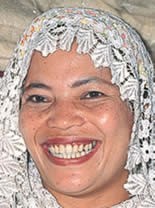Duri in Indonesia

Photo Source:
Copyrighted © 2026
Anonymous All rights reserved. Used with permission |
Send Joshua Project a map of this people group.
|
| People Name: | Duri |
| Country: | Indonesia |
| 10/40 Window: | Yes |
| Population: | 151,000 |
| World Population: | 151,000 |
| Primary Language: | Duri |
| Primary Religion: | Islam |
| Christian Adherents: | 2.00 % |
| Evangelicals: | 0.04 % |
| Scripture: | New Testament |
| Ministry Resources: | Yes |
| Jesus Film: | Yes |
| Audio Recordings: | Yes |
| People Cluster: | Bugi-Makassar of Sulawesi |
| Affinity Bloc: | Malay Peoples |
| Progress Level: |
|
Introduction / History
The Duri (also called Massenrempulu) live in Enrekang regency of Indonesia, a mountainous area with a cool climate in the middle of the South Sulawesi province. The Duri area consists of 17 villages spread among multiple districts. This area is close to a major road which is passable by automobiles. The majority of Duri people live close to the main road, but several groups live in the high mountainous areas. Some Duri, primarily men, have migrated to other areas.
The Duri speak a language of the same name. This language has two dialects: the more prestigious dialect spoken in a central area around the villages Cakke and Kalosi and a less prestigious dialect in the Baraka district. The Duri are the only speakers of this language.
What Are Their Lives Like?
The majority of the Duri live by farming, tending orchards, raising livestock and making handicrafts. Their main crops are red onions, coffee, rice and vegetables. The Duri also make traditional cheese, known as dangke. They sell this cheese in the traditional market, held in specific locations once or twice a week.
The Duri have a family-oriented attitude and practice gotong royong (mutual help and cooperation). In the past, their society was divided into layers known as nobility, commoners and slaves, but these distinctions have disappeared.
Today, education and wealth determine social status. The Duri measure wealth in terms of ownership of water buffalos, land, gold and houses. Generally, the more educated move to the city. The Duri are very open minded toward education and other things that can raise their standard of living. Their schools teach the national Indonesian language, along with Duri. Both adults and children enjoy reading, though only a few books are available in their language.
What Are Their Beliefs?
The Duri mainly follow Islam combined with traditional animistic beliefs. They hold spiritual powers in awe and trust in a dukun (shaman/healer/occultist) to heal sicknesses and cast out evil spirits. A small number of Duri still identify themselves as animists who practice Alu' Tojolo.
A Christian minority is found in the villages of Baroko and Benteng Alla, at the border of Toraja.
What Are Their Needs?
They need transportation infrastructure to enable more profitable sales of their crops. Around 60% of villages do not possess sufficient transportation infrastructure, the result being that the distribution of their goods is expensive and time consuming.
They need investment - both capital and training - in their agricultural industry. The sale of dangke cheese could be expanded through industrial processing and more attractive packaging. In addition, the children need improved health and nutrition.
Because of their interest in reading, the Duri would benefit from literature in their own language. The New Testament, the JESUS Film, and multiple audio recordings are available in the Duri language.
Prayer Points
Pray for effective distribution of the New Testament among the Duri and for opportunities to show the JESUS Film.
Ask God to raise up loving workers to bring the gospel to the Duri and to train them in more productive and profitable agricultural methods.
Ask God to place in their hearts a longing for a God who knows and loves them.
Pray for a Disciple Making Movement among the Duri.